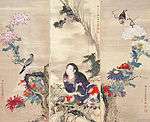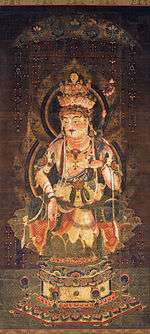List of Cultural Properties of Japan - paintings (Tottori)
This list is of the Cultural Properties of Japan designated in the category of paintings (絵画 kaiga) for the Prefecture of Tottori.[1]
National Cultural Properties
As of 1 February 2016, three Important Cultural Properties have been designated (including one *National Treasure), being of national significance.[2][3][4]
| Property | Date | Municipality | Ownership | Comments | Image | Dimensions | Coordinates | Ref. |
|---|---|---|---|---|---|---|---|---|
| *Fugen Bosatsu, colour on silk 絹本著色普賢菩薩像 kenpon chakushoku Fugen Bosatsu zō | late Heian period | Chizu | Bujō-ji (豊乗寺) | .jpg) | 102.4 centimetres (40.3 in) by 52.1 centimetres (20.5 in) | 35°15′38″N 134°12′23″E / 35.260513°N 134.206388°E | ||
| Fugen and the Ten Rakshasa, colour on silk 絹本著色普賢十羅刹女像 kenpon chakushoku Fugen jū-rasetsu-nyo zō | Kamakura period | Tottori | Jōnin-ji (常忍寺) | with two of the Four Heavenly Kings in the foreground and two bodhisattvas behind[5] | .jpg) | 35°30′08″N 134°13′18″E / 35.502265°N 134.221709°E | ||
| Yōryū Kannon, colour on silk 絹本著色楊柳観音像 kenpon chakushoku Yōryū Kannon zō | Goryeo dynasty | Tottori | Bujō-ji (豊乗寺) (kept at Tottori Prefectural Museum) | Goryeo Buddhist painting; alternatively identified as of Yuan origin[6] | .jpg) | 106 centimetres (42 in) by 54.6 centimetres (21.5 in) | 35°30′30″N 134°14′10″E / 35.508282°N 134.236139°E | |
Prefectural Cultural Properties
As of 1 May 2015, nineteen properties have been designated at a prefectural level.[7][8]
| Property | Date | Municipality | Ownership | Comments | Image | Dimensions | Coordinates | Ref. |
|---|---|---|---|---|---|---|---|---|
| Bamboo and Plum, colour on paper with gold ground - Plants and Insects, colour on paper 紙本金地著色竹梅図・紙本著色草虫図 衝立 shihon kinji chakushoku chikubai zu・shihon chakushoku sōchū zu tsuitate | late Edo period | Tottori | Tottori Prefectural Museum | pair of screens by Oki Ichiga (沖一峨) | 35°30′30″N 134°14′10″E / 35.508282°N 134.236139°E | |||
| Amida Triad, colour on silk 絹本着色阿弥陀三尊来迎図 kenpon chakushoku Amida sanzon zu | C14 | Tottori | private | .jpg) | ||||
| Dragon and Tiger byōbu 龍虎図屏風 ryūko zu byōbu | late Edo period | Tottori | private | pair of six-fold screens by Katayama Yōkoku (片山楊谷) | .jpg) .jpg) | |||
| Kiku Jidō and Flowers and Birds 菊慈童・花鳥図 Kiku Jidō kachō zu | late Edo period | Tottori | private | three scrolls by Katayama Yōkoku (片山楊谷) |  | |||
| Tōhō Saku, colour on silk 絹本著色東方朔図 kenpon chakushoku Tōhō Saku zu | Edo period | Tottori | Tottori Prefectural Museum | by Hijikata Tōrei (土方稲嶺) | .jpg) | 99.8 centimetres (39.3 in) by 40.6 centimetres (16.0 in) | 35°30′30″N 134°14′10″E / 35.508282°N 134.236139°E | |
| Tigers and Bamboo byōbu 竹虎図屏風 chikko zu byōbu | late Edo period | Tottori | private | pair of six-fold screens by Katayama Yōkoku (片山楊谷) |   | 153.4 centimetres (60.4 in) by 358.7 centimetres (141.2 in) | ||
| Journey to the East, Scenes of Cultivation, and Flowers 絹本著色東下り・耕作・草花図 kenpon chakushoku azuma-kudari kōsaku kusabana zu | late Edo period | Tottori | Tottori Prefectural Museum | five scrolls by Oki Ichiga (沖一峨); Journey to the East is based on an episode in Ise Monogatari |  | 35°30′30″N 134°14′10″E / 35.508282°N 134.236139°E | ||
| Mandala of the Two Realms, colour on silk 絹本著色不動明王像 kenpon chakushoku ryōkai mandara zu | Kamakura period | Tottori | Bujō-ji (豊乗寺) (kept at Tottori Prefectural Museum) | .jpg) .jpg) | 143 centimetres (56 in) by 130 centimetres (51 in) | 35°30′30″N 134°14′10″E / 35.508282°N 134.236139°E | ||
| Fudō Myōō, colour on silk 絹本著色不動明王像 kenpon chakushoku Fudō Myōō zō | Kamakura period | Tottori | Bujō-ji (豊乗寺) (kept at Tottori Prefectural Museum) | .jpg) | 86 centimetres (34 in) by 39 centimetres (15 in) | 35°30′30″N 134°14′10″E / 35.508282°N 134.236139°E | ||
| Flowers and Birds, colour on silk 絹本著色花鳥図 kenpon chakushoku kachō zu | late Edo period | Chizu | private | two scrolls; by Shimada Gentan (島田元旦) | .jpg) 2.jpg) | 134 centimetres (53 in) by 70 centimetres (28 in) | 35°15′52″N 134°13′35″E / 35.264403°N 134.226494°E | |
| Shaka and the Sixteen Benevolent Deities, colour on silk 絹本著色釈迦十六善神像 kenpon chakushoku Shaka jūroku zenjin zō | late Kamakura period | Tottori | Daiankō-ji (大安興寺) (kept at Tottori Prefectural Museum) | .jpg) | 35°30′30″N 134°14′10″E / 35.508282°N 134.236139°E | |||
| Saigyō Viewing Mount Fuji, colour on silk 絹本著色富士見西行図 kenpon chakushoku Fuji-mi Saigyō zu | late Edo period | Tottori | private (kept at Tottori Prefectural Museum) | three scrolls, with inscriptions by Kagawa Kageki (香川景樹) and Kamo Suetaka (加茂季鷹);[9] by Oki Tanyō (沖探容) | 3.jpg) 1.jpg) 2.jpg) | 106.7 centimetres (42.0 in) by 33.5 centimetres (13.2 in) | 35°30′30″N 134°14′10″E / 35.508282°N 134.236139°E | |
| Shoal of Carp, colour on silk 絹本著色群鯉図 kenpon chakushoku gunkoi zu | 1836 | Tottori | Tottori Prefectural Museum | by Kuroda Tōkō (黒田稲皐) | .jpg) | 146 centimetres (57 in) by 55.2 centimetres (21.7 in) | 35°30′30″N 134°14′10″E / 35.508282°N 134.236139°E | |
| Shoal of Swimming Carp, ink on paper, six-fold byōbu 紙本墨画群鯉游泳図六曲屏風 shihon bokuga gunkoi yūei zu rokkyoku byōbu | 1824 | Tottori | Tottori Prefectural Museum | pair of screens; by Kuroda Tōkō (黒田稲皐) (alternatively attributed to Kuroda Inamine (黒田稲嶺)) | .jpg) 2.jpg) | 160 centimetres (63 in) by 375.5 centimetres (147.8 in) | 35°30′30″N 134°14′10″E / 35.508282°N 134.236139°E | |
| Fierce Tigers, colour on silk 絹本著色猛虎図 kenpon chakushoku mōko zu | late C18 | Tottori | private (kept at Tottori Prefectural Museum) | three scrolls by Katayama Yōkoku (片山楊谷) | 1.jpg)   | 35°30′30″N 134°14′10″E / 35.508282°N 134.236139°E | ||
| Dragon in Clouds, ink on paper 紙本墨画雲竜図 shihon bokuga unryū zu | late Edo period | Tottori | Tottori Prefectural Museum | two scrolls; by Hijikata Tōrei (土方稲嶺) | .jpg) 2.jpg) | 57.5 centimetres (22.6 in) by 134.0 centimetres (52.8 in) | 35°30′30″N 134°14′10″E / 35.508282°N 134.236139°E | |
| Old Tree, light colour on paper 紙本淡彩老樹図 shihon tansai roju zu | late Edo period | Tottori | private | by Takebe Bokusai (建部僕斎) | .jpg) | 35°29′31″N 134°14′47″E / 35.492019°N 134.246428°E | ||
| Thirty-Six Immortals of Poetry 三十六歌仙額 shihon tansai roju zu | 1650 | Tottori | Tottori Tōshō-gū (kept at Tottori Prefectural Museum) | thirty-six panels by Kanō Tan'yū (Ono no Komachi pictured) | _-_Komachi.jpg) | 58.7 centimetres (23.1 in) by 36.8 centimetres (14.5 in) | 35°30′30″N 134°14′10″E / 35.508282°N 134.236139°E | |
| View of Edo, colour on silk 絹本著色江戸風景図 kenpon chakushoku Edo fūkei zu | Edo period | Tottori | private (kept at Tottori Prefectural Museum) | | 35°30′30″N 134°14′10″E / 35.508282°N 134.236139°E | |||
See also
- Cultural Properties of Japan
- List of National Treasures of Japan (paintings)
- Japanese painting
- Kamiyodo Haiji
- List of Historic Sites of Japan (Tottori)
- List of Museums in Tottori Prefecture
References
- ↑ "Cultural Properties for Future Generations". Agency for Cultural Affairs. Retrieved 25 February 2016.
- ↑ 国宝・重要文化財 [Number of National Treasures and Important Cultural Properties by Prefecture] (in Japanese). Agency for Cultural Affairs. 1 February 2016. Retrieved 25 February 2016.
- ↑ "Database of National Cultural Properties: 国宝・重要文化財(美術品)(絵画 鳥取県)" (in Japanese). Agency for Cultural Affairs. Retrieved 25 February 2016.
- ↑ キーワード検索 国指定の絵画 [Search: National Cultural Properties - Paintings] (in Japanese). Tottori Prefecture. Retrieved 25 February 2016.
- ↑ 絹本著色 普賢十羅刹女像 [Fugen and the Ten Rakshasas] (PDF) (in Japanese). Tottori City. Retrieved 8 June 2014.
- ↑ 絹本著色楊柳観音像 [Yōryū Kannon, colour on silk] (in Japanese). Tottori Prefecture. Retrieved 8 June 2014.
- ↑ キーワード検索 県指定の絵画 [Search: Prefectural Cultural Properties - Paintings] (in Japanese). Tottori Prefecture. Retrieved 25 February 2016.
- ↑ 都道府県別指定等文化財件数(都道府県分) [Number of Prefectural Cultural Properties by Prefecture] (in Japanese). Agency for Cultural Affairs. 1 May 2015. Retrieved 25 February 2016.
- ↑ 絹本著色富士見西行図 [Saigyō Viewing Mount Fuji] (PDF) (in Japanese). Tottori City. Retrieved 8 June 2014.
External links
- (Japanese) Cultural Properties in Tottori Prefecture
This article is issued from Wikipedia - version of the 2/25/2016. The text is available under the Creative Commons Attribution/Share Alike but additional terms may apply for the media files.
